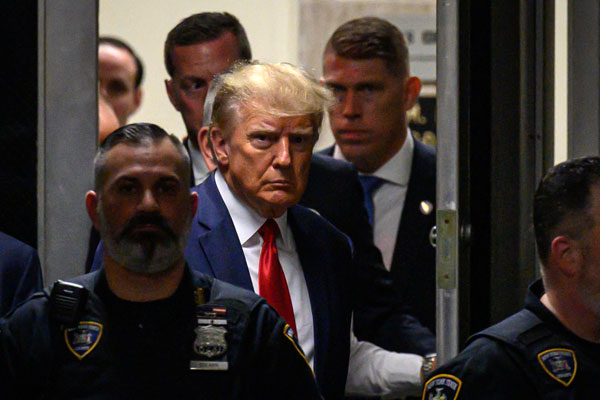Prime
King Trump on trial

Mr Richard K. Sherwin. Photo/Courtesy
What you need to know:
- One could rationalise such a display of political support as the Republican Party closing ranks around its presumptive presidential nominee and de facto leader. That is true, as far as it goes. But the implications lead far beyond conventional partisan politics.
The drama starring former US President Donald Trump that is now playing out in a New York City courtroom is more than just a criminal trial.
It is a contest between competing conceptions of power: a liberal-democratic system of law versus an illiberal conception that locates the source of authority outside the current legal system.
According to the conventional view, apart from the fact that for the first time in American history the defendant is a former president (and current presidential candidate), this is just another criminal case.
Prosecutors are seeking to prove that Trump deliberately and unlawfully falsified business records to mask paying for the adult-film actress Stormy Daniels’ silence regarding her alleged sexual encounter with him.
The state is also claiming that by falsely labelling hush money as “legal fees,” Trump and his agents hid from the public relevant information about candidate Trump during the critical final days of the 2016 presidential election campaign.
If prosecutors can additionally prove that Trump’s actions advanced other unlawful activity – such as tax fraud or campaign-finance violations – the initial crime can be enhanced from a misdemeanour to a felony, potentially exposing Trump, if convicted, to a prison sentence.
But the conventional view cannot explain why a parade of Republican officials, starting with Representative Mike Johnson who, as Speaker of the House, holds one of the most powerful positions in Washington, are showing up at Trump’s trial.
Johnson has been joined by Senator Rick Scott of Florida, who is running for re-election in November, and Senator JD Vance of Ohio, who is widely seen as a vice presidential contender.
One could rationalise such a display of political support as the Republican Party closing ranks around its presumptive presidential nominee and de facto leader. That is true, as far as it goes. But the implications lead far beyond conventional partisan politics.
If Trump’s allies are signalling loyalty, it seems reasonable to question what exactly they are demonstrating loyalty to. It is difficult to avoid concluding that their show of solidarity is meant to express support for Trump’s brazen claim that he is the victim of a show trial orchestrated by his political enemies, notably President Joe Biden, who are using fake law to interfere with his freedom to seek the highest office in the land.
If, as Trump claims, “the genie” is “out of the box,” which is to say, if the rule of law already has been suspended, and the power of the Department of Justice is now being used as a weapon against political enemies, why not give the other side a taste of their own medicine? Trump has signalled his intent to do exactly that: “[I]f I happen to be president and I see somebody who’s doing well and beating me very badly, I say, go down and indict them, mostly they would be out of business. They’d be out. ”
This is how political thuggery is normalised. First, project the abuse you commit onto your political opponents in order to justify acting in kind. Then, when your criminal acts catch up with you, wear any ensuing criminal indictments as what Trump calls a “badge of honour” – projecting his victimhood onto his supporters. As Trump puts it: “I’m being indicted for you.”
The kind of political authority that Trump aspires to is utterly at odds with a liberal democratic understanding of power as flowing from the bottom up – from “We the People” who freely choose to delegate their power to (or withdraw it from) their political representatives. By contrast, in an illiberal democracy, power flows from the top down – from a supreme leader who claims that only he can make the people’s power real by virtue of embodying their collective will. This kind of personal assertion of sovereign power echoes in Trump’s authoritarian rhetoric: “I am your justice ... I am your retribution.”
So, when high-ranking politicians and wannabe power brokers show up in Trump’s courtroom to demonstrate solidarity with him, this is not politics as usual against the backdrop of a conventional criminal trial. These loyalists are signalling their willingness to validate an alternative, illiberal source of sovereign power, independent of the US Constitution and the rule of law.
One can only imagine how stunned America’s anti-royalist founders would be to learn that an American president would invoke the conception of power embodied in the famous words of a 17th Century absolutist: “L’État, c’est moi.”
-- Project Syndicate
Richard K. Sherwin is professor emeritus of Law at New York Law School




